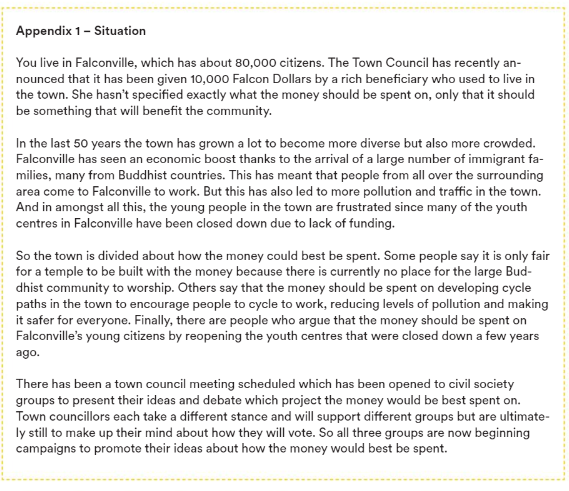Objectives
- To simulate different methods of participation and getting your voice heard
- To experience an example of democratic participation and citizenship
- To think about the importance of different fundamental rights
Before the Session
- Be aware that this activity can take a long time, consider splitting it over two group nights or it would be a perfect activity to do at camp when you have more space and time.
- Photocopy the role cards, situation and rules of debate
- Prepare some small pieces of paper to be ballots
- Ensure you have space set out for the town council meeting and separate spaces for the different groups so that they can meet others and discuss their position beforehand
What to do
Start by reading out the description of the situation:

Show participants the list of different roles (ideally printed) and ask everyone to select one for themselves. Alternatively, you can delegate roles; it is important that there is a fairly equal spread among the group.
Hand out the role cards and indicate where people can meet up before to discuss their position, and where the town council meeting will take place later on.
Explain the rules of debate:
- The meeting will be chaired by the Mayor.
- If you wish to speak, you should raise your hand and get permission from the Mayor.
- Comments should be brief, not long speeches, and should not exceed 2 minutes
- The meeting will close after 40 minutes, with a vote on what should be done with the money.
- Anyone attending the meeting is entitled to speak in the debate and to vote at the end.
Give the participants time before the council meeting starts for them to meet other groups and prepare what they want to say and how they want to vote. Encourage groups to think about other ways they can make their voice heard and influence people. They can use the art supplies available to make campaign materials and organise a mini-protest. Make sure that the groups interact before the council meeting, perhaps making it compulsory to speak to at least one other group before the start of the meeting.
Use their preparation time to set up the space for the Council Meeting. Ideally people should sit in a semi-circle or horseshoe shape with the Mayor at the front in a slightly elevated position. Groups should be able to sit together with their name tags on the tables in front of them.
When the planning time is up (you should set a timer), ask the Mayor to call the citizens for the Council meeting. They should remind the citizens of the rules of debate and give a short speech to introduce the meeting, explaining the situation again.
At the end of the meeting, the Mayor should call for a vote. When the votes have been counted and the result declared, you should announce the end of the activity and invite people to bring their chairs into a circle for debriefing. Before you begin the debriefing, ask everyone to shake their bodies or greet everybody by their real names to ‘shake off’ the roles in the simulation.
Debriefing
- What was the result of the vote?
- Did it reflect the position of the person you were playing?
- Did it surprise you?
- How easy was it to identify with your role? Why, or why not?
- How much influence do you think you (in your role) had on the result? Was this fair?
- How did you try to get your opinion across? Do you think it worked?
- What happened in the period of time before the council meeting?
- How did you use it to try and get your opinion across?
- Did the interaction with other people or groups change your perspective? Did it alter your approach or attitude to the situation? Did anyone change sides as a result?
- What do you think about these different types of participation? Was the council meeting the best way to influence the decision that was made? Or did your campaigns and protests beforehand made a bigger difference?
- What was the role of the town councillors? Did they influence the decisions at all?
- What was the role of the young people? Could you influence the decisions?
- What is good about making decisions in a town council meeting like this one?
- Can you see any problems with this method of taking decisions?
- How would you feel if this case arose in your town? What would you do? Has this activity altered your attitude at all?
- Why is it important that we participate in democratic processes?
To finish, explain to the group that Articles 12 and 13 of the UNCRC are to ‘respect for the views of the child’ and ‘freedom of expression’. What do you think of these rights? How do they relate to the simulation of the Town Council meeting? Do you think these rights are observed in our own community?
Tips for facilitators
- When deciding on roles, it is important to get an equal distribution of people so that you don’t end up with a situation where only one person is fighting their corner. You can also hand out the roles at random, but then you run the risk that for example the mayor is someone who does not feel comfortable speaking in public.
- If people have other ideas about how the money should be spent, then this is also okay. The participants should be encouraged to engage in the activity and if this means changing the stance of the groups then you should be flexible about this.
